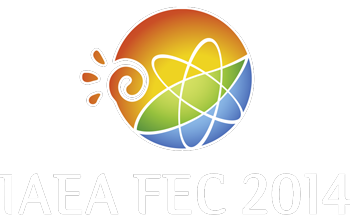Speaker
Dr
Hideaki Miura
(National Institute for Fusion Science)
Description
Two-fluid effects on pressure-driven unstable modes are studied numerically to understand physics in linear and nonlinear evolution of them in a heliotron device. Full 3D simulations show that the introduction of the two-fluid term can bring about the deterioration of the stabilizing effect of the parallel heat conduction through generation of large magnetic perturbations, to lead to a saturation profile worse than that in single-fluid MHD. Possible contributions of the gyro-viscosity to the saturation of the modes are also shown based on the complementary 2D simulations.
Two-fluid effects in simulations of the Large Helical Device are studied by the use of the MINOS code for the initial equilibrium of Rax=3.6m and beat=5%. Both the two-fluid MHD and the single-fluid MHD equations are solved in the helical-toroidal coordinate for the fully toroidal system. It is shown that the two-fluid term can enhance the perturbation spontaneously, and change the constitution of dominant Fourier coefficients in the exponential growth. Many of the Fourier coefficients in the two-fluid MHD acquire larger amplitudes than those in the single fluid MHD simulation, either because their exponential growth is not stabilized by the parallel heat conduction or because they acquire large amplitude spontaneously by the two-fluid effects.
The deterioration is also closely related with the nonlinearity of the two-fluid term which causes energy transfer from a large to a small scale and broadens the energy spectrum distribution. Our 3D simulations as well as the complementary 2D simulations show that the two-fluid MHD plasma acquires larger amplitudes and wider distribution of the spectrum than the single-fluid MHD plasma. Especially, it is shown that the two-fluid effects broaden the spectrum through the nonlinear energy transfer and the gyro-viscosity does not necessarily suppress the high wave number region sufficiently. Thus, the two-fluid term can cause a strong magnetic field perturbation by the large amplitudes as well as by the wider spectrum, weakening the stabilizing by effect of the parallel heat conduction in the nonlinear stage.
| Country or International Organisation | Japan |
|---|---|
| Paper Number | TH/P5-17 |
Author
Dr
Hideaki Miura
(National Institute for Fusion Science)
Co-authors
Dr
Atsushi Ito
(National Institute for Fusion Science)
Dr
Masahiko Sato
(National Institute for Fusion Science)
Mr
Ryosuke Goto
(Graduate University of Advanced Studies)
Mr
Tomoharu Hatori
(Graduate University of Advanced Studies)

